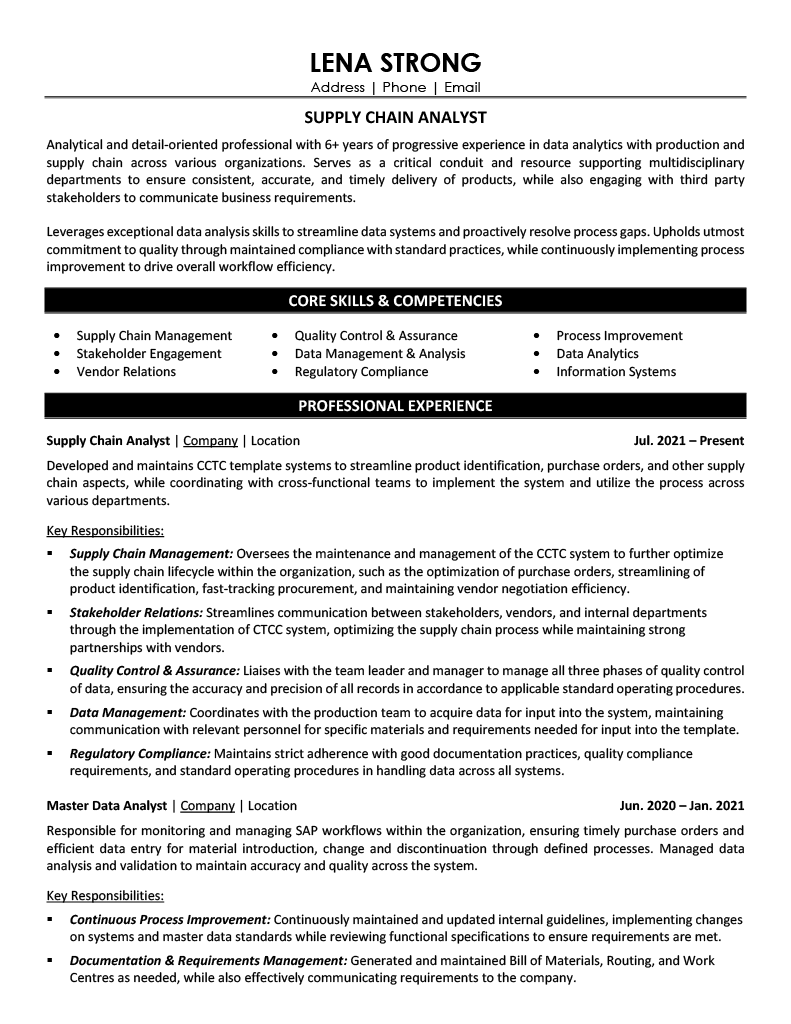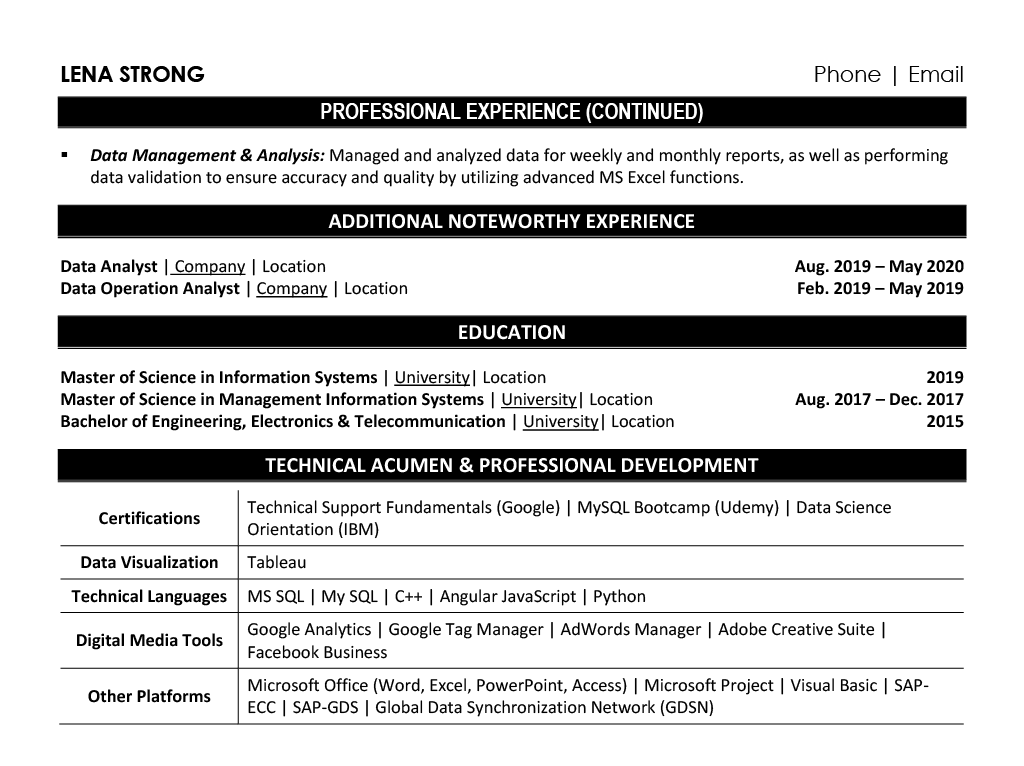

In today's complex supply chain world, turning data and logistics expertise into compelling resume content can feel impossible. Getting noticed among hundreds of analyst applications takes more than listing software skills and certifications.
Are you struggling to showcase the real value you bring to supply chain operations? Your resume needs to tell the story of how you optimize processes, cut costs, and keep operations flowing smoothly - all while speaking the language hiring managers want to hear.
Resume Target specializes in helping supply chain analysts translate complex achievements into clear, powerful statements. We know exactly how to position your analytical skills and operational improvements to land interviews with top employers in this competitive field.


In today's interconnected global marketplace, Supply Chain Analysts serve as the strategic architects who ensure products flow seamlessly from manufacturer to consumer, with their work directly impacting up to 70% of a company's total operating costs through optimized procurement, production, and distribution processes.
Using advanced data analytics tools and industry expertise, these professionals dive deep into sales patterns, inventory levels, and transportation networks to identify bottlenecks, forecast demand, and recommend cost-saving improvements that keep businesses competitive and customers satisfied.
Whether you're just starting out or looking to advance your career, the field of supply chain analytics offers exciting opportunities to grow from entry-level analysis to senior strategic roles where you'll shape entire global supply networks and drive business transformation.
Let's talk about what's exciting in the Supply Chain Analyst field! Your career path offers impressive earning potential with multiple advancement opportunities. As you progress from entry-level positions to executive roles, your compensation can more than triple - and that's just the beginning of what's possible in this dynamic field.
Figures from: Salary.com
Starting as a Supply Chain Analyst opens doors to exciting growth opportunities in logistics and operations. From entry-level analysis to executive leadership, your career path can lead to influential roles in global supply chain management.
Beyond basic analytical abilities, advancing in supply chain management requires a strategic blend of technical expertise and leadership capabilities.
- Supply Chain Software Proficiency (SAP, Salesforce) - Production Planning and Inventory Management - Data Analytics and Mathematical Modeling - Cross-functional Team Leadership and CommunicationLaunch your supply chain analyst career by starting in entry-level positions that build foundational skills in inventory management, data analysis, and logistics coordination while gaining hands-on industry experience.
To advance toward your goal of becoming a Supply Chain Analyst, you'll need to develop essential competencies including quality management and control skills, collaboration abilities, and strong problem-solving capabilities.
Requirements from CIO
From bustling logistics hubs to government centers, supply chain analyst roles span diverse sectors and major metro areas.
Figures from Zippia
Struggling to showcase your supply chain expertise, data analysis skills, and process improvements in a way that catches a hiring manager's attention? This comprehensive, section-by-section guide will help you create a powerful Supply Chain Analyst resume that highlights your most impressive achievements and demonstrates your value to potential employers.
If you're like most Supply Chain Analysts, condensing your complex data analysis skills and process improvements into a few powerful sentences can feel as challenging as optimizing an entire distribution network.
While you excel at identifying bottlenecks and streamlining operations across global supply chains, translating those achievements into a compelling summary that catches a hiring manager's attention requires a different kind of strategic thinking.
How would you describe your unique blend of analytical skills and supply chain expertise in a way that sets you apart from other analysts in the field?
Reason: Supply Chain Analysts need to immediately establish their analytical prowess while differentiating themselves in a competitive field. This helps create a compelling opening that showcases your professional identity.
What are the primary supply chain domains (procurement, logistics, inventory management, demand planning) where you've developed the deepest expertise throughout your career?
Reason: This question helps you identify and articulate your core specializations within the broader supply chain field, allowing recruiters to quickly align your expertise with their needs.
How do you combine your technical proficiency in supply chain tools/systems with your business acumen to drive organizational value?
Reason: Modern Supply Chain Analysts must bridge technical capabilities with business impact. This question helps frame your summary to show both analytical capabilities and business value creation.
As a Supply Chain Analyst, you'll need to showcase both your analytical expertise and your practical operational knowledge, from demand forecasting to inventory optimization.
Your resume should highlight your proficiency with supply chain management software like SAP or Oracle SCM, alongside your ability to analyze KPIs, manage vendor relationships, and drive process improvements.
Showcase your supply chain expertise by organizing your work history into three powerful sections: a concise role overview that sets the stage, measurable achievements that highlight your impact on efficiency and cost savings, and core responsibilities that demonstrate your analytical and operational capabilities.
Many Supply Chain Analysts struggle to translate their daily operational improvements and cost-saving initiatives into compelling resume achievements. Transform your complex supply chain metrics into powerful success stories by connecting your process improvements directly to revenue growth, cost reduction, and operational efficiency gains.
A strong responsibilities section demonstrates how Supply Chain Analysts optimize operations and drive business efficiency beyond basic data entry. Your role description should clearly show how you analyze complex supply networks and translate technical findings into actionable insights that impact the company's bottom line.
Your education and professional certifications demonstrate your expertise in supply chain management and analytics. Lead with your highest relevant degree and most prestigious certifications, especially those focusing on supply chain optimization, demand planning, or logistics management.
Leverage your academic training, internship experiences, and technical certifications to create a compelling skills section that showcases your ability to optimize supply chain operations and analyze complex logistics data.
As an entry-level Supply Chain Analyst, your combination of analytical skills and supply chain knowledge positions you perfectly for roles where you can help organizations streamline their operations and drive efficiency improvements across the supply chain network.
When you're juggling data analytics, process optimization, and cross-functional collaboration, it's challenging to capture all your impact in a way that truly resonates with hiring managers.
At Resume Target, we specialize in crafting resumes that showcase the unique value Supply Chain Analysts bring to organizations, having helped countless professionals translate their complex metrics and process improvements into compelling career stories.
With major supply chain transformations happening across industries, now is the perfect time to ensure your resume stands out - let's connect today to craft a document that showcases your true potential.
Impress any hiring manager with our Supply chain resume writing service. We work with all career levels and types of Supply chain professionals.
Learn More → Supply chain Resume Writing Services